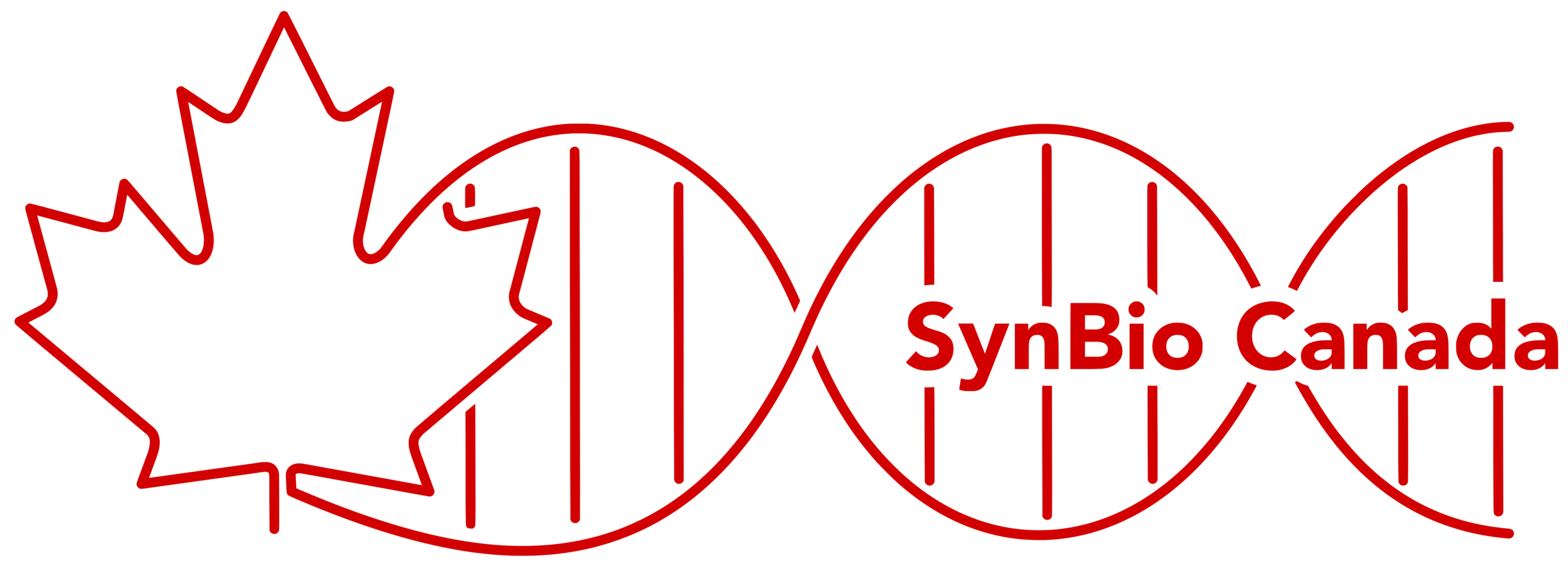Quick Chat: Christian Euler
Emma Lindsay - October 17, 2022
Christian Euler is the Co-Founder and Director of Strain Engineering of Phycus Biotechnologies. He completed his BSc in Biochemistry and BASc in Chemical Engineering at the University of Ottawa. He recently completed his PhD in Biochemical Engineering at the University of Toronto under the supervision of Radhakrishnan Mahadevan, where he worked in synthetic and systems biology
What is Phycus Biotechnologies?
We are a company that uses synthetic biology to power our fermentation processes. Right now we have a process where we make glycolic acid, primarily for cosmetics, although we are looking at other markets as well. I am in Sydney, Nova Scotia where we've built a demo scale facility up to 1000 liters, and I'm running that project. I’m also working with our employees to drive the development of new products using synthetic biology. The core of what we do is powered by synthetic biology, and we have a lot of fermentation expertise. We run the gamut designing and building the organism, and then bringing it up to a process scale and making a product with it.
Where did you get the idea to start Phycus Biotechnologies?
It came from my Co-Founder, Vikram Pandit. In his PhD work, he created a technology that could be useful and spin out into something marketable, and I was really interested in that. Even though my research wasn't really related, I had the skills and knowledge to be able to contribute, so we decided to work together. That was back in 2017 or so. At that point we were working in flasks, the 50 mL scale. We've since hired four people, one of them has moved on, we have some employees, and we've scaled up to 1000 liters. But, it really came out of his PhD work.
What markets are you looking to branch out to beyond cosmetics?
Glycolic acid is a huge commodity chemical that is used in a lot of different spaces. It can be polymerised into polyglycolic acid, which is used in a lot of packaging. It's a next gen polymer, a lot of food packaging people are interested in that because it is biodegradable and it has a lot of useful properties. It's also used to make solvents. Our core mandate is to reduce the carbon footprint of chemical production. Right now, glycolic acid is made from formaldehyde which is a byproduct of oil and gas, which is not great. A lot of solvents that are used for paints and industrial solvents come from glycolic acid. It's also used as a cleaner and disinfectant. It's one of these chemicals that has a really broad use base, which is part of the reason we went after it. Cosmetics are interesting because consumers are very interested in sourcing, whereas in these other spaces, people are less interested in that, it's more about the bottom line. I think in cosmetics, people have a bit more money and time to spend figuring out where the ingredients in their products come from because they're putting them on their face. There’s maybe a little more of a perception of risk there. The consumers in cosmetics are really driving the green transition in that world, and were working with that movement.
What does the typical day look like at Phycus Biotechnologies?
It’s tricky because there is not really a typical day. Right now, we are in a bit of a transition because we've run our 1000 liter process, and we've gotten all the information out of that process that we needed to get. That was a demonstration, it was about producing some product for a couple of smaller customers. It was more about generating information so we can then model the scale up to the next scale. Right now we are preparing for a 10x scale up to a 11000 liter reactor. Our typical days are a little bit boring because we are in the office in spreadsheets, putting together information. This includes technical information for engineering teams at the other site and also information for investors. When we are in full production mode we would have two week cycles. The first week we would be doing the fermentation, and we run it with the help of some technicians here. It runs 24 hours a day for the first three days or so, so that means being on shift. First shift is six to two, then two to ten, and then ten to the next morning, which would typically be me. That's on the plant floor doing technical work, working with this huge reactor that’s two stories tall, monitoring it, sampling, making sure that things don’t go wrong, and when they do go wrong, because that's inevitable, solving those problems. The second week would be taking all the data that we generated, processing it, turning it into meaning, and doing process improvement. Because every run you generate a ton of data, we dedicate that time to take all that information and see what went well, what can we do better next time, what tweaks will we make, doing inventory, and preparing for the next run. The person in charge of the synthetic biology work, he's in the lab manufacturing DNA, making strains, testing those strains. When we’re in production mode, we’re doing less or none of that. So it's a bit dynamic. There's a lot of things going on. There's three of us here and two in Toronto. We do have our areas of expertise here, but because there’s only three of us, we end up overlapping a lot and helping each other out, which is great. Our engineer has learned a lot of biology and our synthetic biologist has really gotten into the process side. I think for students of synthetic biology, startups are great environments. It's crazy, fast paced, and there’s lots of stuff going on, but it's a great opportunity to learn everything from end to end.
What inspired you to get into synthetic biology?
There’s a bit of a long history there. Coming out of high school I went to the University of Ottawa, and I’m not sure if they still have it, but at the time they had this research scholarship where you got to do research in the summer after highschool, going into first year, and then after first year, going into second year. I didn't know exactly what I wanted to do. I was in the biotech program which is a double degree in chemical engineering and biochemistry. I chose that because I couldn't decide between science and engineering, so I just decided to do both. I got this scholarship, and on the list of professors accepting people that had this scholarship, Mads Kaern was there. His description seemed interesting to me, as somebody just out of high school with very little understanding of the world. I got put on an iGEM project that summer, one of the first jamborees was that fall and I went to it, and I got really excited with the potential of it. In particular, I saw the potential in terms of emissions reduction in all different sectors, but mostly in chemicals. That was way back in 2008, and I've been involved ever since. I’ve had little breaks where I’ve tried different things, but this is what I’ve wanted to do since then, and here I am doing it.
How would you define synthetic biology?
To me, what it comes down to is doing forward engineering of gene circuits and building a microbe that you're interested in having some function. Synbio started with the toggle switch and the repressilator and these interesting academic exercises in the dynamics that we could produce by building gene circuits. Those early tools that were built are maybe not so useful when you're looking at the industrial scale and actually doing something with them. What we do might look a little bit different. The gene circuits we build are not complex. When you are scaling up to actually produce something, complexity is something you want to minimize, it adds risks to your process. I still think we're doing synthetic biology, even though the cloning work we do is much simpler than these really complex gene circuits that can do all kinds of interesting computations. I think there’s a real scale there of complexity, and you might even say that any GMO falls under the umbrella of synthetic biology. I'm starting to think that this idea of “synthetic” doesn't really make sense at all because humans think of themselves as separate from the rest of the world, but we're not, we’re a part of this world. So our interactions with it aren’t synthetic, they're natural. I understand that we need a name for a field so we can recognize it, but I think that traditional notion of building complex gene circuits is maybe limited, and when we think about synbio we can start to include anything where you're making these deliberate manipulations to get a living system to do what you want it to do.
Why do you think synthetic biology is an important field? What do you think it adds to the world of science?
To me, it really greases the wheels in terms of translation. I definitely consider myself a scientist through and through. I really love doing research and I think that doing research just to generate knowledge is extremely important. I think what's really cool about synthetic biology is it's given the tools and motivation to people to also take what has been done and turn it into something useful. For us, it's about making chemicals in a way that is better for the world. CRISPR work, which really falls under this world of synthetic biology, has the potential to really change the way we approach health. To me that's really neat and maybe that's what differentiates synbio as a separate field. It bridges the gap between knowledge for the sake of knowledge, which is important, and then also using that to create something that is useful for people. I think in the second half of this century, the vast majority of the products we use will come from biology and that's going to be really important and really powerful. I see that as the future, what the power of synthetic biology can bring for us.
Where do you see the field going in the next few years?
That one is a bit hard to say because I’m not necessarily doing academic research. So, it's a bit hard to know what is coming down the pipeline. What I'd like to see is a lot more work on what happens after you've designed your circuit. You’ve got your gene circuit, it can do a thing, then let's do some industrial work and figure out what that looks like in terms of a process. So I’d like to see more of that happening. What we're seeing now, especially in Canada, there's a small but really dedicated community bringing synbio projects to the world. There's quite a few startups like ours who are doing good work, and I want to see that continue. I want to see them working with academics and universities to be pushing the research to support that.
The work of Christian Euler and Phycus Biotechnologies in developing formaldehyde free, bio-based, biome friendly cosmetics and personal care products are contributing to reducing our carbon footprint and progressing the development of sustainable chemical products.

